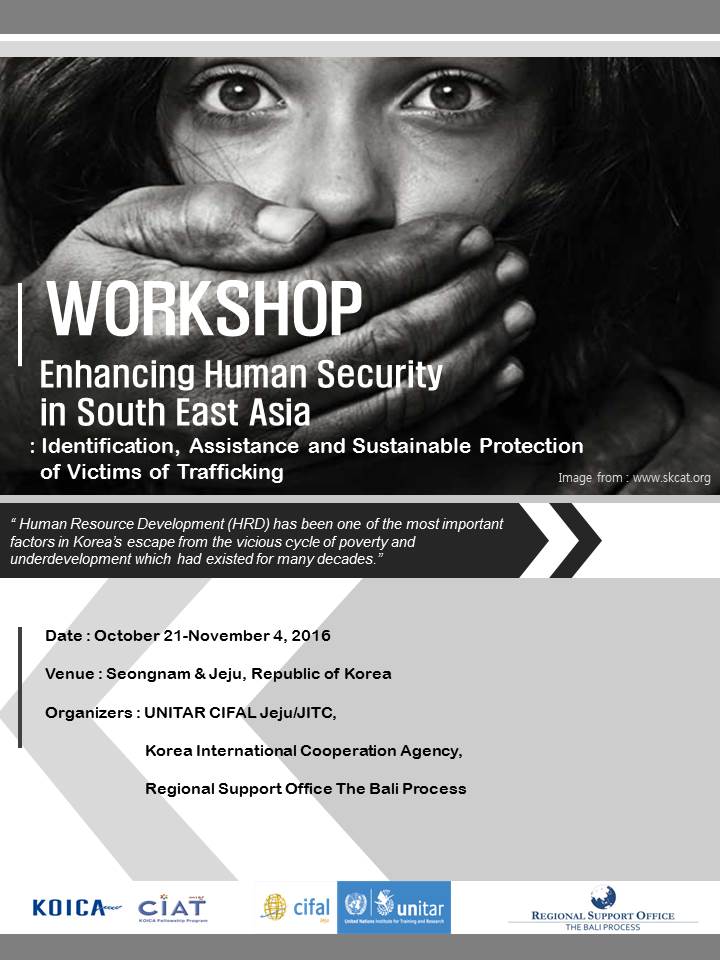CIFAL Jeju/JITC provides a variety of training programs to enhance capacity for national and local communities in the Asia-Pacific region to benefit from holistic and multi-disciplinary approaches available in such diverse areas as human trafficking, migration and refugees, urban poor, resilience and disaster risk reduction, making peaceful and inclusive societies, and so on.

 2016.08.10
2016.08.10
|
Seongnam and Jeju, Republic of Korea, 21 October-4 November, 2016 Background Human trafficking is a vicious chain that binds victims to criminals. We must break this chain with the force of human solidarity. (UN Secretary General Ban Ki-moon)
Event objectives The capacity building training workshop will: ? Demonstrate the linkages between human security and the victim of trafficking (VOT) to increase awareness; ? Explain and apply standards and exchange good practices in identifying, assisting and protecting victims of trafficking; ? Analyze how anti-trafficking strategies, policies and frameworks can be adapted for local implementation and present inter-agency/governmental coordination methods; and ? Promote information sharing and exchange of best practices between central/provincial governments and NGOs/local actors Event type Workshop Date 21 October - 4 November, 2016 Venue ? Korea International Cooperation Agency(KOICA) International Cooperation Center, Seongnam, Korea ? UNITAR CIFAL Jeju/Jeju International Training Center (JITC), Jeju-do, Korea Organizers ? UNITAR CIFAL Jeju ? KOICA ? Regional Support Office of the Bali Process Targeted audience ? National and local government officials and other related personnel from NGOs who directly work with the victims of trafficking from Cambodia, Laos, Myanmar, Vietnam, Thailand, Indonesia and Malaysia. ? Each country has a quota of three persons; one for a national government official, one for a local government official, and the last one for a NGO worker. ** Participants are expected to work in the related field for at least two years after the workshop. ** Participants should have sufficient command of both written and spoken English. Content The workshop will include the following: ? [Module 1] Basic concepts of human security and human trafficking ? [Module 2] Identification of VOT ? [Module 3] Assistance of VOT ? [Module 4] Sustainable Protection of VOT ? [Module 5] Prevention through awareness raising Learning objectives By the end of the workshop, participants will be able to: ? understand the basic concepts related to trafficking in persons and the difference between human trafficking and human smuggling, forced labour and other related exploitation; ? have increased awareness on human security and human trafficking, especially women, children, and refuges in the region; ? be able to identify key challenges and recognize best practices and lessons learned to address human trafficking and, as well as policy measures for enhancing human security at the local level; ? be able to identify key challenges, recognize and apply practical solutions to ensure that victims of trafficking are protected base of identified needs; ? be able to apply presented tools and methods in their responsibilities; ? apply UNITAR-developed CityShare methodology to rate and compare each other’s anti- trafficking policies, and make specific action plans for local implementation and follow-up of lessons learned (via city-to-city cooperation, awareness raising activities, inter-governmental coordination, and other practical implementation examples); and ? be able to build professional networks, exchange information and knowledge. Methodology The workshop will be comprised of: ? lectures and presentations by experts ? practical exercised and group discussion ? UNITAR CityShare Methodology ? action plan presentation ? study visit UNITAR-developed "CityShare methodology" will be used during the workshop. The "CityShare methodology" aims at optimizing peer learning between local officials and other local stakeholders playing crucial roles in ensuring sustainable municipal development. The methodology consists of various processes of self-assessment, distillation, and transfer of challenges, lessons learned, and good practices between local stakeholders and resource persons. It is also composed of several tools to provide a common framework for the evaluation of experiences made by the participating cities and offer a common language for the exchange and assimilation of experiences, as well as a roadmap for action and progress. Requirements When selected as a participant, you will be required to: ? Submit necessary documents on time, i.e. , registration form etc. ? Complete and submit pre-training readings and assignments, i.e. self-assessment, case study presentation, etc. ? Actively participate in the workshop program. ? Be fluent in written and spoken English. Course certificates KOICA and UNITAR CIFAL Jeju will jointly issue a certificate upon completion of the workshop program. How to apply Send the following 7 documents to cifaljeju.jitc.1@gmail.com by 11 September, 2016 (Sunday): ※ Download forms and guidelines from UNITAR CIFAL Jeju ? Application ? Letter of nomination ? Letter of commitment ? Case study description (see guidelines) ? Acknowledgement, waiver and release of liability ? Consent to collection, usage and disclosure of personal information ? Curriculum vitae (CV) ※ Late application will not be accepted. Note ? Application without required documents will NOT be considered. ? Participation is subject to approval of the application by UNITAR CIFAL Jeju. ? Selected applicants will be notified individually. Assistance with travel cost ? Round trip airfare from home country to Republic of Korea will be covered by KOICA. ? Local expenses (transportation, accommodation and meals) during the workshop will be covered by KOICA. ? Fixed visa fee (KRW 60,000) will be reimbursed after arrival at Korea by KOICA. ? All other expenses (local transportation in their country) are the responsibility of the participants. [이 게시물은 Cifal Jeju님에 의해 2016-12-13 10:23:09 Future에서 이동 됨] |







